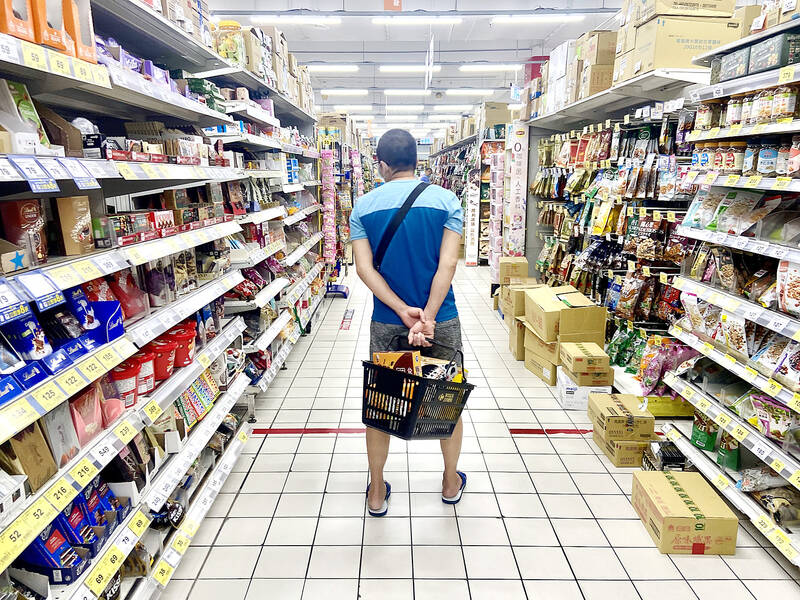The Taiwan Institute of Economic Research (TIER, 台灣經濟研究院) yesterday trimmed its forecast for Taiwan’s GDP growth this year from 3.81 percent to 3.45 percent and expected the pace to slow further to 2.91 percent next year, as global economic headwinds gain force.
Exports and private investment would weaken, leaving domestic demand to drive growth single-handedly, the Taipei-based think tank said.
The war in Ukraine and China’s draconian COVID-19 restrictions derailed global economic recovery this year, and fears of recession next year are developing amid drastic monetary tightening by major central banks aiming to tame inflation, TIER said.

Photo: CNA
“It would take great effort by supply chains to digest excessive inventory, so local firms had better brace for tough times that may prove longer than expected,” TIER president Chang Chien-yi (張建一) told a news conference.
The world could see low growth or recessions in the next two to four years, boding ill for Taiwan’s exports, Chang said.
High inflation in the US means that the world’s largest consumer of electronic gadgets would cut budgets for luxury items, notebook computers and smartphones, which would be unfavorable for local suppliers including mature chipmakers, he said.
FocalTech Systems Co (敦泰電子), a local supplier of touch screen integrated circuits used in flat panels, yesterday said it would shrink its payroll by 10 to 13 percent after incurring NT$2.5 billion (US$78.36 million) in inventory losses last quarter, equal to losses of NT$13.57 per share.
Flat-panel exports last month plunged 42 percent from a year earlier due to inventory adjustments and sluggish demand, government data showed.
US technology giants Tesla Inc, Twitter Inc and Facebook owner Meta Platforms Inc have announced massive layoffs to cope with poor business.
TIER expects exports to expand a modest 2.35 percent next year, from an estimated 9.86 percent increase this year, its report said.
Imports would slump from a 13.21 percent expansion this year to a mild 1.79 percent uptick, as international energy and raw material prices could fall amid tepid demand.
Private investment, a main driver of growth in recent years, would retreat from a 5.87 percent gain this year to a 2.83 percent rise next year, TIER said.
Major technology firms including Taiwan Semiconductor Manufacturing Co (台積電), the world’s top chipmaker, have cut or postponed capital expenditures due to order cancelations and concerns that inventory adjustments would persist through the first half of next year.
TIER Macroeconomic Forecasting Center director Gordon Sun (孫明德) said the US consumer prices last month grew 7.7 percent, still very high despite being milder than expected.

South Korea’s equity benchmark yesterday crossed a new milestone just a month after surpassing the once-unthinkable 5,000 mark as surging global memory demand powers the country’s biggest chipmakers. The KOSPI advanced as much as 2.6 percent to a record 6,123, with Samsung Electronics Co and SK Hynix Inc each gaining more than 2 percent. With the benchmark now up 45 percent this year, South Korea’s stock market capitalization has also moved past France’s, following last month’s overtaking of Germany’s. Long overlooked by foreign funds, despite being undervalued, South Korean stocks have now emerged as clear winners in the global market. The so-called “artificial intelligence

NEW IDENTITY: Known for its software, India has expanded into hardware, with its semiconductor industry growing from US$38bn in 2023 to US$45bn to US$50bn India on Saturday inaugurated its first semiconductor assembly and test facility, a milestone in the government’s push to reduce dependence on foreign chipmakers and stake a claim in a sector dominated by China. Indian Prime Minister Narendra Modi opened US firm Micron Technology Inc’s semiconductor assembly, test and packaging unit in his home state of Gujarat, hailing the “dawn of a new era” for India’s technology ambitions. “When young Indians look back in the future, they will see this decade as the turning point in our tech future,” Modi told the event, which was broadcast on his YouTube channel. The plant would convert

‘SEISMIC SHIFT’: The researcher forecast there would be about 1.1 billion mobile shipments this year, down from 1.26 billion the prior year and erasing years of gains The global smartphone market is expected to contract 12.9 percent this year due to the unprecedented memorychip shortage, marking “a crisis like no other,” researcher International Data Corp (IDC) said. The new forecast, a dramatic revision down from earlier estimates, gives the latest accounting of the ongoing memory crunch that is affecting every corner of the electronics industry. The demand for advanced memory to power artificial intelligence (AI) tasks has drained global supply until well into next year and jeopardizes the business model of many smartphone makers. IDC forecast about 1.1 billion mobile shipments this year, down from 1.26 billion the prior

People stand in a Pokemon store in Tokyo on Thursday. One of the world highest-grossing franchises is celebrated its 30th anniversary yesterday.